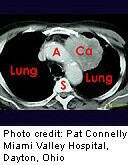CT Screens for Lung Cancer Not a Cure-All
Study says patients should think carefully about test that has no direct evidence of benefit.
|
E-mail this article
Subscribe to news
Printer friendly version
|

(SOURCE: Radiological Society of North America, news release, June 10, 2008)
FRIDAY, June 20 (HealthDay News) -- While CT screening may help reduce lung cancer deaths among current and former smokers, it won't reduce the risk of death from other smoking-related causes, a new study reports.
Researchers at Harvard Medical School and the Mayo Clinic in Rochester, Minn., entered data from 1,520 current and former smokers who took part in a CT screening study into a computer simulation model of lung cancer development.
"We used a carefully developed computer model of lung cancer to simulate individuals who smoke and/or develop lung cancers and go on to get screened or treated. It's sort of like the computer game 'The Sims,' except there are no graphics, and smoking and lung cancer are the main events," study lead author Pamela McMahon, senior scientist at Massachusetts General Hospital and a radiology instructor at Harvard Medical School, said in a prepared statement.
The computer model projections showed that after six years, patients who had five annual CT screenings had a 37 percent increase in lung cancer detection and a 28 percent reduced risk of lung cancer death compared to those who weren't screened. However, those who were screened had only a 4 percent reduced risk of all-cause death.
After 15 years, patients who were screened were 15 percent less likely to die of lung cancer and 2 percent less likely to die of other causes than those who weren't screened.
The findings are in the July issue of the journal Radiology.
"Our study fills in a piece of the puzzle but does not solve it. We are hopeful that randomized trials conducted by the National Cancer Institute will show a benefit from screening. Until then, patients should think carefully about undergoing a test that has no direct evidence of benefit," McMahon said.
Lung cancer is the leading cause of cancer death in the United States, according to the Centers for Disease Control and Prevention. About 168,840 people will die of lung cancer in 2008, the American Cancer Society estimates. Smoking causes about 87 percent of lung cancers and also causes other types of cancers, as well as heart and respiratory diseases.
More information
The U.S. National Cancer Institute has more about lung cancer screening.
Copyright © 2008 ScoutNews, LLC. All rights reserved. 
HealthDayNews articles are derived from various sources and do not reflect federal policy. healthfinder.gov does not endorse opinions, products, or services that may appear in news stories. For more information on health topics in the news, visit the healthfinder.gov health library.